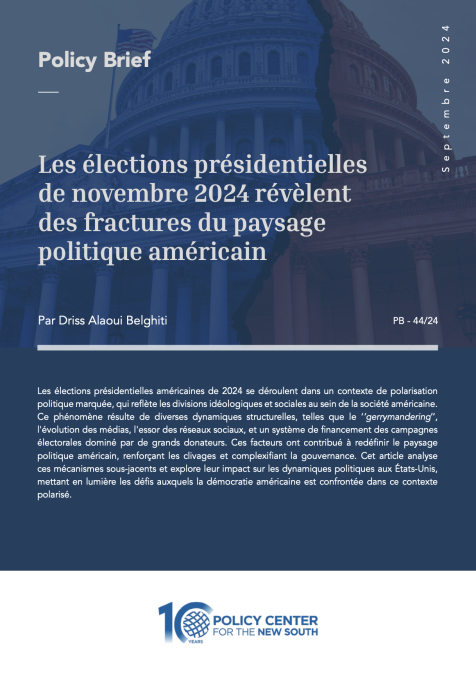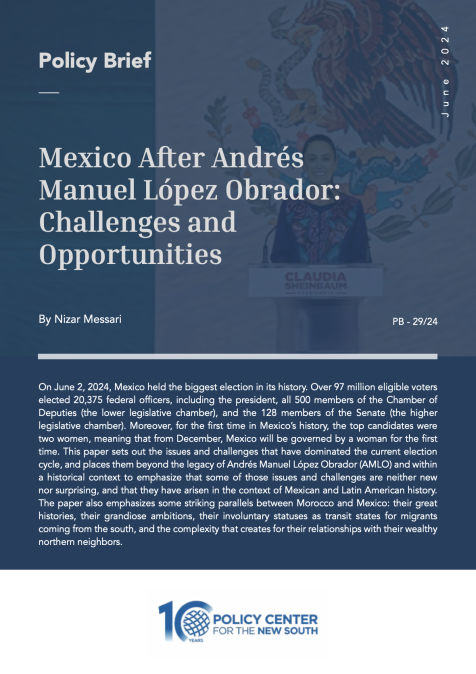Publications /
Opinion
The 2024 Presidential election in the United States will be historic and consequential. Both candidates are history-making in different ways. Democratic nominee, Vice President Kamala Harris, is the first woman of African and Asian descent to become the Democratic Party’s nominee, while President Trump won his party’s nomination without participating in any Republic Primary debates. Even more strikingly different are their parties’ platforms—what they would do if elected. However, it is easy to imagine who Africa and the Diaspora should and will be supporting for President—with all the excitement, joy, and historic outcomes that a President Kamala Harris would bring to African descendants everywhere. Even so, from a political perspective, it will be important for Africa and the Diaspora to set an inclusive, collective agenda, regardless of who is elected U.S. President.
Just recently, I spoke with Delfeayo Marsalis, highly acclaimed composer, producer, musician, and our organization’s (African Diaspora Consortium, ADC), Global Artistic Music Director, about the state of the U.S. Presidential election related to Africa and the Diaspora. He raised a question that has shaped my thinking. He asked, “why shouldn’t we be asking what Africans and the Diaspora can do to impact different and new possibilities regardless of USA presidential election outcomes?”.
Rarely do we ask questions that shape or that can impact our own destinies, possibilities, or future, as a continent or across the Diaspora. Both presidential candidates are discussing several issues that will have serious consequences for Africa and the Diaspora. At the top is migration, but other issues, including climate change, economic challenges, wars, and the shaping of political elections globally are also relevant. These are not just challenges that are impacting the U.S. election, but global challenges in relation to which Africa and the Diaspora should be asking different questions and focusing on shaping different possibilities, outcomes, and new narratives.
The outcome of the U.S. presidential election, for sure, has the potential to write a new narrative, particularly if Harris is elected. She is a daughter of the African Diaspora, and will be the first female President of the U.S. She has demonstrated her support for Africa and the Diaspora by establishing a U.S. Africa and African Diaspora Committee. However, it is up to this Committee to define the agenda and not wait to be told what the focus should be. On the other hand, if former President Donald Trump wins, it would have the potential to generate a different set of questions and narratives, which can set the stage for more specific focus to change his nuanced use of old negative playbooks and codes to describe the history and culture of the impact of Africa and the Diaspora globally.
Whatever the outcome, Africa and the Diaspora has a worldwide role to play in amplifying the collective voices of African descendants and defining their own agenda. For starters, as it relates to migration, whether forced or voluntary, the focus on defining new possibilities is paramount, given that the issue of migration has historically been significant for Africa and the Diaspora since the Transatlantic Slave Trade. However, that issue has had inhumane and negative consequences for African descendants when highlighted globally. The most recent example, as it relates to the U.S. presidential election, is former President Trump’s baseless description during his debate with Vice President Harris of Haitian immigrants living in Springfield, Ohio as stealing and eating cats and dogs. Such assertions should be an outrage for everyone, not just African descendants, but should be particularly unifying for African descendants across all countries. A broader question should be, what are the different ways to address this inhumane treatment of immigration collectively and globally, given its historical and ongoing impact on Africa and the Diaspora?
The intolerable treatment of immigrants globally clearly suggests that the issue warrants the same global attention afforded to climate change! Yet, each country has different policies, as though there is no interconnection between inhumane treatment and suffering across countries. Can there be a way for Africa and the Diaspora to unite around this global crisis, even though there are migrants from different backgrounds? What can unite African and the Diaspora around such a common crisis is the treatment of African descendants wherever they migrate.
Another way in which African and Diaspora voices must be heard collectively and amplified is through making the case that migration benefits countries as much as it benefits individuals, as has been argued by some economists. That issue was highlighted in an article in The Economist about Haitians in Springfield, Ohio: “It seemed to be a case study in migration’s tradeoffs—a debate that often pits economists, who point to long-term overall benefits, against politicians, who highlight shorter-term local concern.” However, as is often the case, the emphasis is on the taking not the giving.
Immigrants enrich where they live more than just economically. They also contribute culturally. For example, a small Church in Alabama emphasized how Haitian immigrants are enriching their culture through their language, food, and in other ways. Why aren’t more of these stories being highlighted in the press? Consequently, if the issue of immigration is to be addressed by individual countries rather than highlighted as a worldwide issue, like climate change, African descendants will be left to address this huge crisis on a fragmented basis. Even so, new possibilities must urgently be proposed, not just to the U.S. President-elect, but to global leaders everywhere.
Africa and the Diaspora can and should impact the U.S. Presidential election in other ways beyond awaiting the outcome. Where are the voices and the narratives from Africa and the Diaspora on specifying other priorities? What about the need to focus on education at all levels in Africa and the Diaspora. Education is the essential link of Africa and the Diaspora, and is the essential uplift out of poverty, not leaving anyone behind, as Vice President Kamala Harris speaks about in her platform. In the age of trying to eliminate ‘difference’ in all forms, there need to be inventive, thoughtful ways to interconnect history, education, and the arts/culture for individual and community uplift, using Africa and the Diaspora as a guide, creating the awe and wonder of the African Diaspora, and its impact on cultures worldwide.
Yes, the U.S. Presidential election will be consequential. However, Delfeayo Marsalis was on to something when he suggested that we should be asking different questions. It is noteworthy that we are awaiting the outcome of the 2024 U.S. election, as has been the case of awaiting election outcomes for centuries, rather than developing a different agenda—a playbook that places more possibilities, different outcomes, and new narratives led by Africa and the Diaspora, not by presidential elections.
Let’s remember the African proverb, “until the lion learns to speak, the tales of the hunt will always favor the hunter”.







